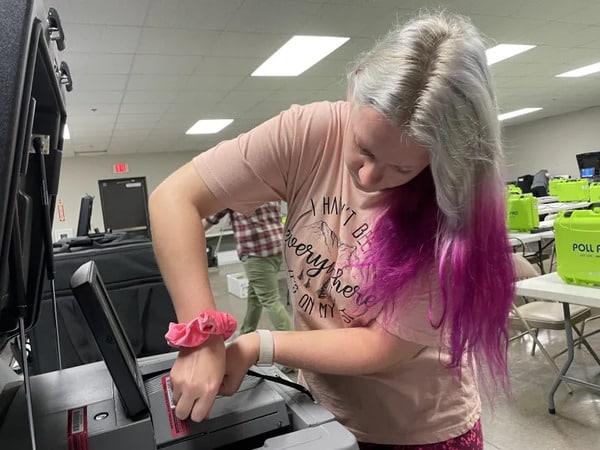
Chelsey Stutz, a poll worker, wraps up practicing to set up for Election Day during an April 17 training at the Marion County Election Board Service Center in Indianapolis. (Photo/Sophie Young at Mirror Indy)
This story was originally published by Mirror Indy, a Free Press Indiana partner.
By Sophie Young
Mirror Indy
April 19, 2024
Each election year, poll worker Chelsey Stutz picks a theme color for her hair and outfit. For 2024, it’s pink.
Stutz, a resident of Camby, has lost track of how many years she’s worked at vote centers on Election Day. She estimates about 10, and the Indiana primary on May 7 will be her second election as the inspector at the Decatur Township Government Center.
Her civic involvement reaches past Election Day; she’s on the board of directors for the League of Women Voters in Indy.
“I end up doing a lot of civic activities,” she said. “And I feel like working the polls on Election Day is the most basic. That’s the one that if you have the ability to do it, you should.”
Poll workers are citizens who are paid — up to $150 — help make sure the election process runs smoothly. In Marion County, the Democratic and Republican parties recruit poll workers first. Brent Stinson, the deputy director of the Marion County Election Board, said it can be hard to find Republican poll workers, since Marion County is a democratic county. His goal is to have at least one Republican at each vote center.
[Learn everything you need to know about early voting here.]
After the parties make selections, the Election Board fills spots up until Election Day, and registered voters can apply here. High school students who are at least 16 years old and have a signed permission form can also apply to be a poll worker.
Learn more about how to become a poll worker here — and meet three more people who keep polls running smoothly in Marion County.
There are two types of poll workers: clerks and inspectors. Clerks staff the check-in table and help answer voters’ questions. They are encouraged, but not required to complete training.
Barbee will be an alpha inspector in the primary election. Alpha inspectors are basically back-up inspectors: They help out if the person meant to lead a vote center calls in sick or if one location gets busy. She lives in Warren Township and expects to serve at the Warren Township Government Center.
As an inspector, she’s required by the federal government to complete training sessions.
In her 15 years of experience, the most common problem she helps voters with during primaries is choosing a party. In primary elections, each voter has to choose a Democratic or Republican ballot — and after they make their choice on the ballot, they cannot change their minds.
“They may want to get mad that they said ‘Republican’ or ‘Democrat,’ and they can’t change,” Barbee said.
Another thing Barbee and several other inspectors mentioned is lots of voters who have moved to another neighborhood — or even county — haven’t updated their voter registration. People in that situation have to fill out a provisional ballot, which the Election Board will review and may ask for follow-up actions on.
Every inspector has to follow a checklist so vote centers follow accessibility guidelines outlined in the Americans with Disabilities Act. Ayres, who lives in southwest Indianapolis, has helped voters with different accommodations during her three times working the polls.
Every polling place has a table with an adjustable height that can be lowered for people who use wheelchairs or other mobility aids. She’s helped visually impaired voters plug headphones into the Express Vote — the machine you use to make your selections. They then use a braille keypad to vote.
[Unable to vote in person? Register for your absentee ballot before April 25.]
Since the Help America Vote Act of 2002, also known as HAVA, these accommodations have been required. Find more resources here.
Voters who want to talk through concerns or report problems can call the Hoosier Voter Hotline at 866-461-8683. HAVA staff will be available for calls 6 a.m. to 7 p.m. on Election Day and 8 a.m. to 4:30 p.m. on normal business days.
Barnett is a veteran of the U.S. Air Force, and a self-described “a**hole.” By that, he means that he sticks to the rules, and makes sure everyone else does, too.
He lives in Pike Township, and he will be at Pike Camby Community Church on Election Day at 5 a.m. to set up before he spends the day leading the vote center.
He became a poll worker in 2016 because of “Donald Trump and the Republican Party as it’s currently constituted.”
“They say there was election fraud, and I thought that was B.S.,” Barnett said. “And I said, ‘But the only way I’ll know for sure is if I become involved in the process, and participate and know how it works.’ So now I’m able to look people in the eye and say, ‘There’s no way to cheat the system.’”
Have a question about how things work in Indianapolis? Email Sophie Young, service journalism reporter, at sophie.young@mirrorindy.org.